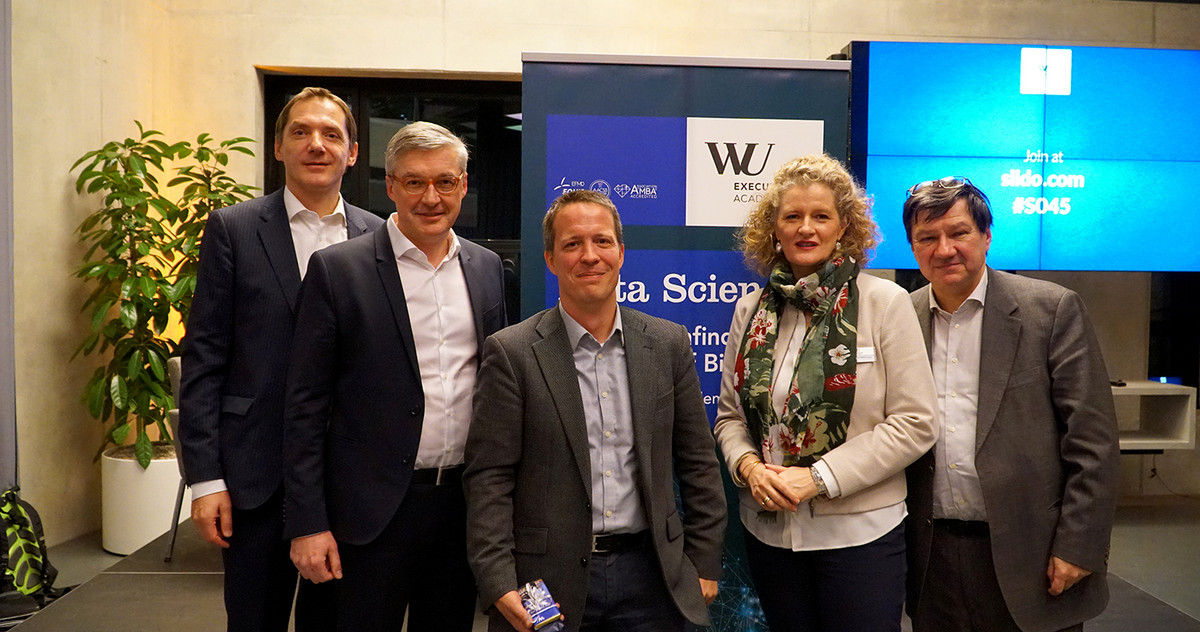Overview
Recommendations
Next Steps
Social media
Panel discussion with Thomas Kolarik, Erste Bank and Bernhard Bauer, Siemens
The new technologies are changing the business world in unprecedented ways. But what exactly does this mean, and what are the trends that businesses have to respond to? WU researchers Axel Polleres and Alfred Taudes discussed these questions on February 27, 2018 with experts Thomas Kolarik of Erste Bank and Bernhard Bauer of Siemens during an event entitled “Data Science, AI, Big Data and Blockchain. How the digital transformation affects your business”. Taking up an invitation extended by the WU Executive Academy, a vast audience, including many alumni, turned out to learn more about the latest experience of researchers and managers. The evening's moderator was Barbara Stöttinger, Dean of the WU Executive Academy.
At Siemens, artificial intelligence and machine learning play an important role across the entire B2B spectrum: in the solutions business (e.g. automotive), in the services business, in software development and in sales, as Bernhard Bauer, Senior Director Digital Factory and Digital Officer of the Siemens industrial division in Austria and the CEE region, explains. The “Digital Factory” division of Siemens already offers comprehensive “digital enterprise” solutions, i.e. digital versions of factories for the digital analysis, simulation and optimization of operations and production processes. According to Bernhard Bauer, Siemens is clearly ahead of the curve in this field. In other areas, e.g. business analytics/smart sales by means of big data/artificial intelligence, Siemens has some catching up to do when compared to, for instance, the Business2Consumer sector. In parallel to “cloud computing” (Siemens “MINDSPHERE” cloud), the company also uses “edge computing” in the context of pilot projects designed around the needs and requirements of clients: “We do this whenever there is not enough time to send data into a cloud and back again, and joined-up analysis is required before processing can continue,” explains Bernhard Bauer. Recently, all business divisions have increasingly embraced the “walking-skeleton” approach, which is about creating skeleton applications that cover all the critical layers and technologies but do not offer much “substance” (in terms of functionality).Siemens: AI and “walking skeletons”

“AI, machine learning and big data have a fundamental impact on our business,” says Thomas Kolarik, Managing Director and CTO of s IT Solutions Austria, the IT provider of the Erste Bank and Sparkassen group in Austria. According to him, a predictive maintenance system based on artificial intelligence and machine learning has been set up for “George” so as to keep George's downtime to a minimum. s IT regularly organizes internal hackathons with a view to pushing technological progress. These events feature internal Kaggle competitions in the course of which the IT and business sections join forces to work on new products in mixed teams.
“During the most recent competition, the teams have managed to train their AI models to such a degree and extent that they can now predict the purchasing behaviors of clients with 80% accuracy,” explains Thomas Kolarik, adding that Erste Bank's IT subsidiary deals with blockchain technology also in the context of pilot projects. And regarding data protection and the General Data Protection Regulation, “we are a prize student”, he concludes.
The short program Data Science also focuses on the topic of big data. For more information click here.